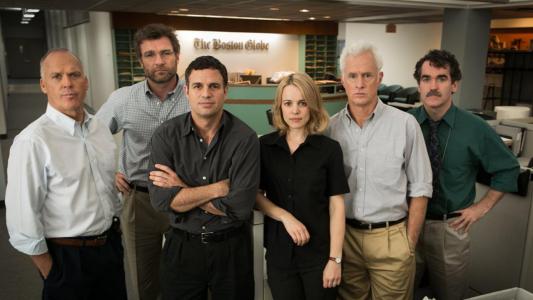Shifting the Spotlight
By Michael Higgins
If the Roman Catholic Church hoped to escape from the “spotlight”, as it were, at the Academy Awards Ceremony in Hollywood last month, no such reprieve was granted. Spotlight, the American film that explored with searing forthrightness the rot at the heart of the Archdiocese of Boston around clerical sex abuse, won Best Picture of the Year Award. Statements, testimonials and public declarations of outrage, accompanied the cinema hoopla, the book version of the film is showcased in all major book chains, media outlets are abuzz with commentary and ancillary revelations, and the Church, beleaguered and spiritually depleted by the scandal, once again faces the seemingly endless task of trying to get ahead of the depressing news focus around this institutional blight. Measures It is not that the Church hasn’t reacted with new protocols, disciplinary measures, appropriate suspensions, and a refreshing transparency of effort and accountability. In many jurisdictions it has. There is a Pontifical Commission for the Protection of Minors and Vulnerable Adults, bishops have been fired for negligence, alleged cases are now pursued with commendable rigour, and an abundance of educational and pastoral efforts to ensure compliance with civil law have taken shape. The Kansas City-based independent publication the National Catholic Reporter editorialised: “With Spotlight awarded the Oscar for best motion picture, the public humiliation for the Catholic Church is now as thorough as one might expect in a culture where what is on the screen is often the most persuasive element in fashioning public opinion.” Learned tomes, scientific studies, data accumulations, pastoral statements, papal directives, television documentaries and polemical exposes pale by comparison with cinema, the most popular cultural genre in American life. It is important to note that the film is not anti-Catholic; it is anti-corruption. The overwhelming majority of the investigative reporters are Catholic, if not observant, educated at the very seat of America’s Irish Catholic power and influence – Boston – and the majority of The Boston Globe’s readership at the time was Catholic. The current cardinal-archbishop, the Capuchin Sean O’Malley, has done much healing and is a favourite of Pope Francis, while his immediate predecessor, the disgraced Bernard Law, languishes in Rome. The film does not spend much time exploring the ecclesiastical politics and personalities at the heart of the scandal. Its job is to underscore the diligence and noble persistence of the ‘Spotlight’ team of journalists at The Boston Globe, and indeed, their moral imperative as they understood it, to uncover the truth and to bring to glaring light a pattern of perfidious behaviour: priest abusers were methodically moved and shielded and the abused silenced or dismissed. Spotlight has had its moment. Consciousness has once again been raised – with a global punch this time that cannot be ignored – but what of the future? Can the spectre of clerical sex abuse ever be exorcised? Have we made substantial changes to the structures to ensure, as best as is possible, that such a pathological recurrence is definitively a thing of the past? In the same month that Spotlight won its highest accolade, The Club, a new film by the Chilean director Pablo Larrain, portraying the aftershocks of clerical abuse through exploring the psychological and spiritual makeup of priest abusers consigned to a remote sanctuary premiered in the US. A major commission investigating decades of alleged abuse of choirboys – the storied Domspatzen or Cathedral Sparrows – in Regensberg, Germany during the tenure of Georg Ratzinger, Pope Emeritus Benedict’s elder brother, is nearing completion, Cardinal George Pell’s video appearance before an Australian commission into clerical sex abuse was a less than stellar display of credible contrition, and there is controversy among some members of Pope Francis’ own Pontifical Commission. It is time to move beyond the cosmetic, the reactive, the strategically prudential to serious essentialist reform; it is time to make ecclesiological change, to differentiate between a purified presbyterate and a corrosive clericalism; it is time for a spiritual and structural overhaul. The Church has been there before; it has cleansed itself and reconceived its mission in deeper Gospel terms. It can do so again. It is time to shift the spotlight.
|
.
Any original material on these pages is copyright © BishopAccountability.org 2004. Reproduce freely with attribution.
